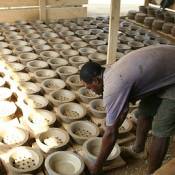German Initiative Aims to Help Developing Countries Profit From Carbon Finance
Some parts of the developing world have capitalized on carbon finance, and others haven’t. A new program spearheaded by the German Ministery of Environment (Bundesministerium für Umwelt) aims to help under-represented parts of the planet catch up over the next three years.

28 May 2011 | Some parts of the developing world have capitalized on carbon finance, and others haven’t. A new program spearheaded by the German Ministery of Environment (Bundesministerium fí¼r Umwelt, BMU) aims to help under-represented parts of the planet catch up over the next three years.
Under the plan, the Gold Standard Foundation – which is a standard-setting body set up by WWF and other NGOs – will develop innovative tools that seek to lower entry barriers and allow for the scale-up of carbon market activities in under-represented regions, with an emphasis on Sub-Saharan Africa.
Beyond lack of capacity and financing, an additional challenge to developing large-scale carbon credit projects in these underdeveloped regions has been the low existing baselines relating to emissions. A key part of the Foundation’s work over next three years will be innovative actions and methodologies to build credits.
Over the course of the project, the Foundation will focus on involving developers and other stakeholders from Africa to understand the needs, concerns and opportunities in the region. Indeed, the first round of stakeholder consultations will be held at the Africa Carbon Forum in Marrakesh, Morocco.
This stakeholder input will be essential as this three-year program uses its funding to develop top-down methodologies tailored for the suppressed demand and micro-scale projects existing in this region. Through that process, the foundation will generate more refined guidelines for Gold Standard Program of Activities (PoAs) and research the potential of expanding the program regionally.
The program will also result in new rules and schemes for micro-scale activities, build institutional capacity for Designated National Authorities (DNAs) and Designated Operational Entities (DOEs), and finally, create ‘entrepreneurial’ capacity within the project developers.
“It’s great to be recognized for our innovation and expertise by BMU and chosen for this exciting new development program,” said Adrian Rimmer, CEO of The Gold Standard Foundation. “Through the provision of new methodologies, innovative tools and institutional capacity building, The Gold Standard will help the German Government to improve access to carbon finance, increase the involvement of the private sector and help shape climate policy frameworks for the future.”
The idea behind the development of Gold Standard methodologies over the next three years is that it will “lead the way and demonstrate how things can be used and applied in the compliance market,” says Rimmer.
Additional resources
Please see our Reprint Guidelines for details on republishing our articles.

